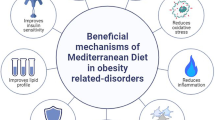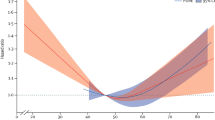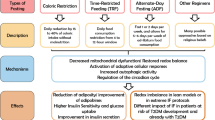Abstract
Background
The prevalence of obesity and metabolic syndrome (MetS) during childhood and adolescence is rising significantly worldwide. Previous studies have shown that following a healthy dietary pattern, like the Mediterranean diet (MD), might be an efficacious approach for the prevention and management of MetS during childhood. In the present study, we aimed to examine the effect of MD on inflammatory markers and components of MetS among adolescent girls with MetS.
Methods
This randomized controlled clinical trial was conducted on 70 girl adolescents with metabolic syndrome. Patients in the intervention group followed a prescribed MD, while participants in the control group received dietary advice according to the food pyramid. The length of intervention was 12 weeks. Participants’ dietary intakes were evaluated using three 1-day food records throughout the study. Anthropometric measures, inflammatory markers, systolic and diastolic blood pressure, and hematological factors were assessed at the baseline and end of the trial. An intention-to-treat approach was taken into account for the statistical analysis.
Results
After 12 weeks, participants in the intervention group had lower weight (Ptime*group ≤ 0/001), body mass index (BMI) (Ptime*group ≤ 0/001), and waist circumference (WC) (Ptime*group ≤ 0/001) compared with those in the control group. In addition, MD resulted in a significantly reduced systolic blood pressure compared to the those in the control group (Ptime*group ≤ 0/001). In terms of metabolic variables, MD led to a significant decrease in fasting blood glucose (FBS) (Ptime*group ≤ 0/001), triglycerides (TG) (Ptime*group ≤ 0/001), low-density lipoprotein (LDL) (Ptime*group ≤ 0/001), homeostatic model assessment of insulin resistance (HOMA-IR) (Ptime*group = 0/02) and a meaningful increase in serum levels of high-density lipoprotein (HDL) (Ptime*group ≤ 0/001). In addition, adherence to the MD resulted in a significant reduction in serum levels of inflammatory markers including Interleukin 6 (IL-6) (Ptime*group = 0/02) and high-sensitivity C-reactive protein (hs-CRP) (Ptime*group = 0/02). However, no significant effect was seen on serum levels of tumor necrosis factor α (TNF-α) (Ptime*group = 0/43).
Conclusion
Overall, the findings of the present study revealed that consumption of MD for 12 weeks resulted in a favorable effect on anthropometric measures, components of MetS, as well as on some inflammatory biomarkers.

Similar content being viewed by others
Data availability
The data generated or analyzed during the current study are not publicly available but are available from the corresponding author upon reasonable request.
Change history
17 July 2023
A Correction to this paper has been published: https://doi.org/10.1007/s40618-023-02149-6
References
Kassi E, Pervanidou P, Kaltsas G, Chrousos G (2011) Metabolic syndrome: definitions and controversies. BMC Med 9(1):1–13
Weihe P, Weihrauch-Blüher S (2019) Metabolic syndrome in children and adolescents: diagnostic criteria, therapeutic options and perspectives. Curr Obes Rep 8(4):472–479
Khashayar P, Heshmat R, Qorbani M, Motlagh ME, Aminaee T, Ardalan G et al (2013) Metabolic syndrome and cardiovascular risk factors in a national sample of adolescent population in the middle east and north Africa: the CASPIAN III study. Int J Endocrinol 2013:702095
Al-Hamad D, Raman V (2017) Metabolic syndrome in children and adolescents. Transl Pediatr 6(4):397
Chen G-C, Koh W-P, Neelakantan N, Yuan J-M, Qin L-Q, van Dam RM (2018) Diet quality indices and risk of type 2 diabetes mellitus: the Singapore Chinese Health Study. Am J Epidemiol 187(12):2651–2661
Torun B (2005) Energy requirements of children and adolescents. Public Health Nutr 8(7a):968–993
Braet C (1999) Treatment of obese children: a new rationale. Clin Child Psychol Psychiatry 4(4):579–591
Akbarzadeh Z, Nourian M, Hovsepian S, Kelishadi R (2018) Dietary patterns and metabolic syndrome in children and adolescents: a systematic review. JPR 6(2):2–13
Martino F, Puddu PE, Lamacchia F, Colantoni C, Zanoni C, Barillà F et al (2016) Mediterranean diet and physical activity impact on metabolic syndrome among children and adolescents from Southern Italy: contribution from the Calabrian Sierras Community Study (CSCS). Int J Cardiol 225:284–288
Davis C, Bryan J, Hodgson J, Murphy K (2015) Definition of the Mediterranean diet; a literature review. Nutrients 7(11):9139–9153
Thodis A, Itsiopoulos C, Kouris-Blazos A, Brazionis L, Tyrovolas S, Polychronopoulos E et al (2018) Observational study of adherence to a traditional Mediterranean diet, sociocultural characteristics and cardiovascular disease risk factors of older Greek Australians from MEDiterranean ISlands (MEDIS-Australia Study): protocol and rationale. Nutr Diet 75(1):44–51
Godos J, Zappalà G, Bernardini S, Giambini I, Bes-Rastrollo M, Martinez-Gonzalez M (2017) Adherence to the Mediterranean diet is inversely associated with metabolic syndrome occurrence: a meta-analysis of observational studies. Int J Food Sci Nutr 68(2):138–148
Panagiotakos DB, Pitsavos C, Chrysohoou C, Skoumas J, Tousoulis D, Toutouza M et al (2004) Impact of lifestyle habits on the prevalence of the metabolic syndrome among Greek adults from the ATTICA study. Am Heart J 147(1):106–112
Esposito K, Marfella R, Ciotola M, Di Palo C, Giugliano F, Giugliano G et al (2004) Effect of a Mediterranean-style diet on endothelial dysfunction and markers of vascular inflammation in the metabolic syndrome: a randomized trial. JAMA 292(12):1440–1446
Velázquez-López L, Santiago-Díaz G, Nava-Hernández J, Muñoz-Torres AV, Medina-Bravo P, Torres-Tamayo M (2014) Mediterranean-style diet reduces metabolic syndrome components in obese children and adolescents with obesity. BMC Pediatr 14(1):1–10
Kastorini C-M, Milionis HJ, Esposito K, Giugliano D, Goudevenos JA, Panagiotakos DB (2011) The effect of Mediterranean diet on metabolic syndrome and its components: a meta-analysis of 50 studies and 534,906 individuals. J Am Coll Cardiol 57(11):1299–1313
Mattavelli E, Olmastroni E, Bonofiglio D, Catapano AL, Baragetti A, Magni P (2022) Adherence to the Mediterranean diet: impact of geographical location of the observations. Nutrients 14(10):2040
Kim RJ, Lopez R, Snair M, Tang A (2021) Mediterranean diet adherence and metabolic syndrome in US adolescents. Int J Food Sci Nutr 72(4):537–547
Seral-Cortes M, Sabroso-Lasa S, Miguel-Etayo D, Gonzalez-Gross M, Gesteiro E, Molina-Hidalgo C et al (2020) Interaction effect of the Mediterranean diet and an obesity genetic risk score on adiposity and metabolic syndrome in adolescents: the HELENA study. Nutrients 12(12):3841
Wen W, Piao J, Zhuo Q (2010) Energy requirements of children and adolescents. Wei sheng yan jiu = J Hyg Res 39(6):790–794
Esmaillzadeh A, Mirmiran P, Azadbakht L, Etemadi A, Azizi F (2006) High prevalence of the metabolic syndrome in Iranian adolescents. Obesity (Silver Spring) 14(3):377–382
Gurka MJ, Guo Y, Filipp SL, DeBoer MD (2018) Metabolic syndrome severity is significantly associated with future coronary heart disease in Type 2 diabetes. Cardiovasc Diabetol 17(1):1–9
DeBoer MD (2019) Assessing and managing the metabolic syndrome in children and adolescents. Nutrients 11(8):1788
Pacifico L, Anania C, Martino F, Poggiogalle E, Chiarelli F, Arca M et al (2011) Management of metabolic syndrome in children and adolescents. Nutr Metab Cardiovasc Dis 21(6):455–466
Romagnolo DF, Selmin OI (2017) Mediterranean diet and prevention of chronic diseases. Nutr Today 52(5):208
Richard C, Couture P, Desroches S, Benjannet S, Seidah NG, Lichtenstein AH et al (2012) Effect of the Mediterranean diet with and without weight loss on surrogate markers of cholesterol homeostasis in men with the metabolic syndrome. Br J Nutr 107(5):705–711
Georgoulis M, Yiannakouris N, Tenta R, Fragopoulou E, Kechribari I, Lamprou K et al (2021) A weight-loss Mediterranean diet/lifestyle intervention ameliorates inflammation and oxidative stress in patients with obstructive sleep apnea: results of the “MIMOSA” randomized clinical trial. Eur J Nutr 60(7):3799–3810
Saneei P, Hashemipour M, Kelishadi R, Rajaei S, Esmaillzadeh A (2013) Effects of recommendations to follow the Dietary Approaches to Stop Hypertension (DASH) diet v. usual dietary advice on childhood metabolic syndrome: a randomised cross-over clinical trial. Br J Nutr 110(12):2250–2259
Cowell OR, Mistry N, Deighton K, Matu J, Griffiths A, Minihane AM et al (2021) Effects of a Mediterranean diet on blood pressure: a systematic review and meta-analysis of randomized controlled trials and observational studies. J Hypertens 39(4):729–739
Ceraudo F, Caparello G, Galluccio A, Avolio E, Augimeri G, De Rose D et al (2022) Impact of Mediterranean diet food choices and physical activity on serum metabolic profile in healthy adolescents: findings from the DIMENU project. Nutrients 14(4):881
Al-Aubaidy HA, Dayan A, Deseo MA, Itsiopoulos C, Jamil D, Hadi NR et al (2021) Twelve-week Mediterranean diet intervention increases citrus bioflavonoid levels and reduces inflammation in people with type 2 diabetes mellitus. Nutrients 13(4):1133
Saneei P, Hashemipour M, Kelishadi R, Esmaillzadeh A (2014) The dietary approaches to stop hypertension (DASH) diet affects inflammation in childhood metabolic syndrome: a randomized cross-over clinical trial. Ann Nutr Metab 64(1):20–27
Bujtor M, Turner AI, Torres SJ, Esteban-Gonzalo L, Pariante CM, Borsini A (2021) Associations of dietary intake on biological markers of inflammation in children and adolescents: a systematic review. Nutrients 13(2):356
Galisteo M, Duarte J, Zarzuelo A (2008) Effects of dietary fibers on disturbances clustered in the metabolic syndrome. J Nutr Biochem 19(2):71–84
Swann OG, Kilpatrick M, Breslin M, Oddy WH (2020) Dietary fiber and its associations with depression and inflammation. Nutr Rev 78(5):394–411
Chen J-P, Chen G-C, Wang X-P, Qin L, Bai Y (2017) Dietary fiber and metabolic syndrome: a meta-analysis and review of related mechanisms. Nutrients 10(1):24
Sun B, Shi X, Wang T, Zhang D (2018) Exploration of the association between dietary fiber intake and hypertension among US adults using 2017 American College of Cardiology/American Heart Association Blood Pressure Guidelines: NHANES 2007–2014. Nutrients 10(8):1091
Shinozaki K, Okuda M, Sasaki S, Kunitsugu I, Shigeta M (2015) Dietary fiber consumption decreases the risks of overweight and hypercholesterolemia in Japanese children. Ann Nutr Metab 67(1):58–64
Kobayakawa A, Suzuki T, Ikami T, Saito M, Yabe D, Seino Y (2013) Improvement of fasting plasma glucose level after ingesting moderate amount of dietary fiber in Japanese men with mild hyperglycemia and visceral fat obesity. J Diet Suppl 10(2):129–141
Ghanbari R, Anwar F, Alkharfy KM, Gilani A-H, Saari N (2012) Valuable nutrients and functional bioactives in different parts of olive (Olea europaea L.)—a review. Int J Mol Sci 13(3):3291–3340
Serra-Majem L, Trichopoulou A, de la Cruz JN, Cervera P, Álvarez AG, La Vecchia C et al (2004) Does the definition of the Mediterranean diet need to be updated? Public Health Nutr 7(7):927–929
Michielsen CC, Hangelbroek RW, Feskens EJ, Afman LA (2019) Disentangling the effects of monounsaturated fatty acids from other components of a Mediterranean diet on serum metabolite profiles: a randomized fully controlled dietary intervention in healthy subjects at risk of the metabolic syndrome. Mol Nutr Food Res 63(9):1801095
Lee H, Jang HB, Yoo M-G, Chung K-S, Lee H-J (2019) Protective effects of dietary MUFAs mediating metabolites against hypertension risk in the Korean genome and epidemiology study. Nutrients 11(8):1928
Schwingshackl L, Strasser B, Hoffmann G (2011) Effects of monounsaturated fatty acids on glycaemic control in patients with abnormal glucose metabolism: a systematic review and meta-analysis. Ann Nutr Metab 58(4):290–296
Acknowledgements
We are sincerely grateful to the patients who participated in the present study
Funding
The financial support for this study comes from the Tehran Endocrine and Metabolism Research Center and the Tehran University of Medical Science. The funder had no role in study design, data collection and interpretation, or the decision to submit the work for publication.
Author information
Authors and Affiliations
Contributions
FA, MF and AA contributed to the data acquisition, analysis, interpretation of the data, and manuscript writing; KDj, NS, BL and AE contributed to the study design, interpretation of the data and final revision of the manuscript; CC contributed to the writing and final revision of the manuscript. All the authors approved the submitted version.
Corresponding author
Ethics declarations
Conflict of interest
The authors declare no conflict of interest in publishing this paper.
Ethical approval
The study was approved by the Ethics Committee of the Tehran Endocrine and Metabolism Research Center, Tehran, Iran (IR.TUMS.EMRI.REC.1397.038).
Informed consent
All study participants and their parents provided informed written consent prior to the study commencement.
Additional information
Publisher's Note
Springer Nature remains neutral with regard to jurisdictional claims in published maps and institutional affiliations.
Rights and permissions
Springer Nature or its licensor (e.g. a society or other partner) holds exclusive rights to this article under a publishing agreement with the author(s) or other rightsholder(s); author self-archiving of the accepted manuscript version of this article is solely governed by the terms of such publishing agreement and applicable law.
About this article
Cite this article
Asoudeh, F., Fallah, M., Aminianfar, A. et al. The effect of Mediterranean diet on inflammatory biomarkers and components of metabolic syndrome in adolescent girls. J Endocrinol Invest 46, 1995–2004 (2023). https://doi.org/10.1007/s40618-023-02027-1
Received:
Accepted:
Published:
Issue Date:
DOI: https://doi.org/10.1007/s40618-023-02027-1




